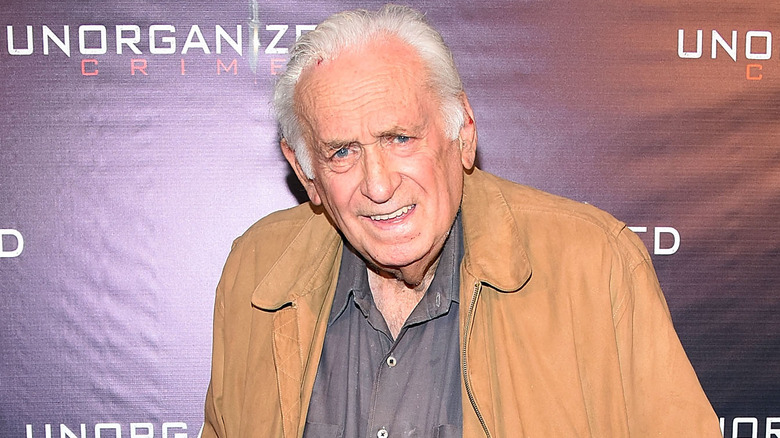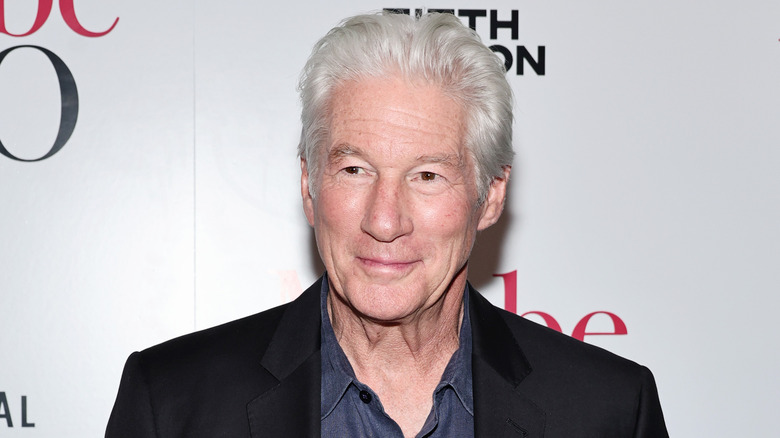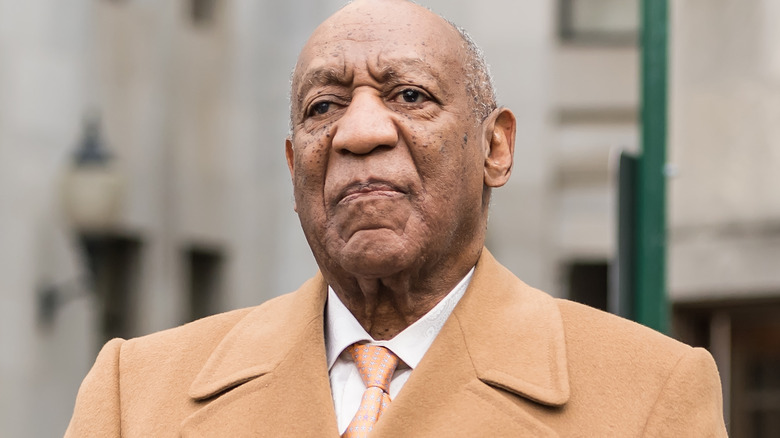Here's Why These Celebs Were Banned From The Oscars
Note: This article discusses instances of sexual assault.
Since the first Academy Awards ceremony in 1929, the glitzy event — commonly known as the Oscars — has become a beloved mainstay in the Hollywood film industry. But as it turns out, keeping this decades-old institution as lustrous and appealing as ever requires some major clean-up behind the scenes. Sometimes, that clean-up comes in the form of years, decades, and lifelong bans on individuals from participating in the Academy's festivities.
As actor Will Smith learned in 2022, one surefire way to get a 10-year ban from the Academy is by becoming physically violent. Smith attacked Chris Rock onstage at the 94th Academy Awards, slapping the comedian across the mouth after Rock, who was hosting the event, made a joke about Smith's wife Jada Pinkett Smith looking like G.I. Jane. While initial reports said Smith refused to leave the ceremony after the incident, Oscars producer Will Packer later clarified that the Academy made no attempts to kick Smith out after his infamous slap.
"I immediately went to the Academy leadership that was on site, and I said, 'Chris Rock doesn't want that.' I said, 'Rock has made it clear that he does not want to make a bad situation worse,'" the producer recalled on "Good Morning America" (via X, formerly known as Twitter). Smith resigned from the Academy soon after the altercation, after which the Academy implemented a 10-year ban from the Oscars starting April 8, 2022.
Carmine Caridi
Will Smith might've had one of the more awkward Oscars moments caught on camera, but the award for First Person to Be Permanently Banned went to Carmine Caridi in 2004. Members of the Academy receive exclusive screeners of undistributed films vying for a nomination. Starting in 2003, members of the Academy became required to sign contracts agreeing they would not share the movies with the public after piracy concerns threatened to dismantle the pre-screening tradition altogether.
According to a 2017 interview with the Hollywood Reporter, Caridi said he and others continued to share these films with small inner circles in a "no harm, no foul" type of agreement. Unfortunately for Caridi, one of the members of his inner circle turned out to be a movie pirate who published the classified screeners on the internet. Caridi told the Hollywood Reporter he received a call from an Academy employee who informed him of his breach of contract, and Caridi's legal and Academy-related troubles only worsened from there.
In addition to being permanently kicked out of the Academy, Caridi was later sued by Warner Brothers and Columbia Pictures. A U.S. District Judge ordered Caridi to pay $300,000 to each studio. "Who the hell knew he was gonna put 'em on the internet?" Caridi lamented to the Hollywood Reporter. "I had no idea. I was duped." Caridi, who had small roles in "The Godfather" and "Some Kind of Wonderful," continued to act after his expulsion. He died in 2019.
Richard Gere
Carmine Caridi's infamous VHS scandal might've earned him the title of first-banned, but a different actor was technically banned before Caridi in 1993 — except his banishment didn't stick. Richard Gere was sentenced to a 20-year ban from the Academy in the early 1990s when the "Pretty Woman" actor veered off-script while presenting the award for Best Art Direction to condemn the Chinese Communist Party for the human rights violations occurring in Tibet.
"With the knowledge of what a horrendous, horrendous human rights situation there is in China [and Tibet], I wonder if we could all send love and truth and sanity to [former Chinese leader] Deng Xiaoping right now in Beijing if maybe he will take his troops, take them away from Tibet, and allow these people to live as free, independent people again," Gere said onstage at the 1993 ceremony (via Marca). Gere was hit with his two-decades-long ban shortly thereafter.
However, the ban was not enforced. The "Chicago" actor returned to the Oscars in 2003 when the musical movie was nominated for and won the Best Picture Award. The Academy even asked Gere to reprise his role as presenter in 2013. Gere joked about the comeback to the Huffington Post, saying, "It seems if you stay around long enough, they forget they've banned you."
Harvey Weinstein
Between his two production companies, Miramax and the Weinstein Company, convicted rapist Harvey Weinstein received more than 300 Oscar nominations and 81 Academy Awards. According to an analysis of acceptance speeches from 1966 to 2016 conducted by Quartz, the not-yet disgraced film producer had been mentioned by name in about 34 speeches. At the time of the analysis, Weinstein's Oscar speech shoutouts were on par with the winners' references to God.
Weinstein's messy fall from Hollywood's good graces began in October 2017, after a New York Times piece dropped decades' worth of bombshells about Weinstein's alleged sexual harassment and assault of women. Shortly after the news broke, the Academy of Motion Picture Arts and Sciences formally expelled Weinstein from the organization.
Although Weinstein initially denied the accusations, he eventually turned himself in to the New York police in May 2018. He was ultimately found guilty and sentenced to 23 years in prison. Four years later, a different trial found Weinstein guilty of yet another incident, adding 16 years to his sentence. In 2022, the announcement of Weinstein's eligibility to appeal his charges had social media in an uproar. Weinstein was serving his sentence at a medium-security state prison in New York.
If you or anyone you know has been a victim of sexual assault, help is available. Visit the RAINN website or contact RAINN's National Helpline at 1-800-656-HOPE (4673).
Bill Cosby
One year after Harvey Weinstein's fall from grace, Bill Cosby followed suit. Allegations of sexual misconduct began swirling around "The Cosby Show" star in 2005 and eventually reached a fever pitch at the height of the #MeToo movement. More than 50 women alleged Cosby had either drugged them, sexually assaulted them, or both. On April 26, 2018, the once-beloved actor was convicted of three counts of aggravated indecent assault.
"The Academy ... has voted to expel actor Bill Cosby ... from its membership in accordance with the organization's Standards of Conduct," the Academy's Board of Governors said in a statement released less than one month after Cosby's conviction (via Rolling Stone). "The Board continues to encourage ethical standards that require members to uphold the Academy's values of respect for human dignity." Cosby never commented on his expulsion.
Three years into his prison sentence, Cosby's sexual assault conviction was overturned by the Pennsylvania Supreme Court due to a previous agreement between Cosby and a former prosecutor, which the court stated was "an affront to fundamental fairness" (via NBC). Cosby's surprising release from prison in 2021 had the internet fuming, with many critics condemning the court's decision. Cosby's lifetime ban from the Academy, however, is still in effect.
Roman Polanski
Bill Cosby wasn't the only Hollywood A-lister to receive a lifetime ban from the Academy of Motion Picture Arts and Sciences in May 2018. The original statement released by the Academy's Board of Governors announcing Cosby's expulsion also included director Roman Polanski. In March 1977, the "Rosemary's Baby" director was charged with drugging and sexually assaulting a then-13-year-old girl. Polanski pleaded guilty to the charge of unlawful sexual intercourse with a minor and spent a little over a month in jail.
The following year, Polanski fled to Europe after hearing a judge planned to reject his plea deal and sentence him to 50 more years in prison. Polanski continued his directorial career overseas, even receiving an Oscar for "The Pianist" in 2003. Due to Polanski's obvious absence from the United States award ceremony, presenter Harrison Ford accepted the Oscar on Polanski's and the Academy's behalf (via YouTube). Polanski's official expulsion took place 15 years later.
In a 2017 interview with the Hollywood Reporter, Polanski defended himself, saying, "As far as what I did: it's over. I pleaded guilty. I went to jail." The director sued the Academy for reinstatement over what Polanski said was an "improper" and "invalid" banishment. A judge upheld the expulsion.
Adam Kimmel
The last person to be banned from the Academy of Motion Picture Arts and Sciences before Will Smith's Oscars slap in 2022 was cinematographer Adam Kimmel, who was expelled from the Academy one year prior. Variety published a scandalous piece about Kimmel, who worked on films like "Beautiful Girls" and "Capote," in 2020, detailing his lengthy history of criminal sexual offenses. The exposé revealed Kimmel to be a registered offender after he was found guilty of engaging in inappropriate sexual behavior with two different girls, both 15 at the time.
The first incident occurred in the early 2000s when Kimmel pleaded guilty in 2004. Kimmel was forced to do 10 days of community service and serve ten years on probation. He was also placed on the offender registry. Six years later, Kimmel struck up another relationship with a 15-year-old and was later charged with fourth-degree sexual assault, failing to register as an offender in Connecticut, and two counts of risk of injury.
One year after Variety's blistering 2020 exposé, the entertainment magazine announced that the Academy had decided to expel Kimmel. "The Academy has a stated policy against abusive and indecent behavior, and takes all matters involving harassment, assault, or misconduct very seriously," the Academy told Variety in 2021.






